There are currently about 26 million refugees globally, the highest number on record.
Turkey hosts more refugees than any country in the world, including 3.6 million Syrian refugees. Like refugees in other countries, Syrians in Turkey must find work in order to support themselves and their families in a new country. Because entering the formal labor market is difficult, entrepreneurship gives refugees a potential way to a sustainable livelihood.
To support refugees in building their own businesses in Turkey, the Livelihoods Innovation through Food Entrepreneurship (LIFE) Project has established two food incubators in the cities of Istanbul and Mersin. Refugees participate in a four-month entrepreneurship incubation program and receive business support services. Over two years, the project has graduated more than 250 entrepreneurs.
WDI is a member of the LIFE Project Consortium, which is led by the Center for International Private Enterprise (CIPE) and funded by the U.S. State Department Bureau for Population, Refugees and Migration (PRM). WDI’s Entrepreneurship Development Center leads the design and development of the curriculum for the entrepreneurship incubation program and supports in-country staff with building their instructional skills. In addition to CIPE and WDI, Consortium members include Union Kitchen and The Stimson Center, all based in the United States, and IDEMA, the project’s implementing partner based in Turkey.
In July, WDI’s Amy Gillett, vice president of Education, and Kristin Babbie Kelterborn, senior project manager, along with Eric Fretz, a WDI faculty affiliate and professor at the University of Michigan, traveled to Istanbul and Mersin to lead workshops on entrepreneurship curriculum development, participate in a business pitch competition for Mersin’s second cohort of entrepreneurs and interview program graduates.
Using some of the photos the pair took, Gillett talks about the trip to Turkey, the work they did and the entrepreneurs they met.
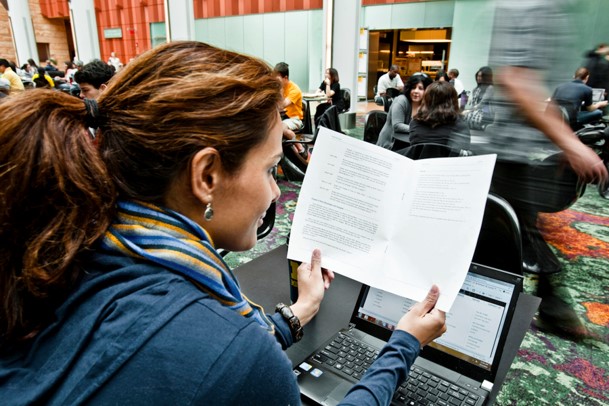
WDI Publishing is organizing a new competition for case studies focusing on the unique advantages and challenges of doing business in the Middle East and North Africa (MENA) region.
Submissions for the competition, “Doing Business in the Middle East, North Africa Region,” should focus on a business dilemma of an organization or company located or doing business in the MENA region. The cases may feature a small or large organization, private sector multinational, non-governmental organization (NGO) or nonprofit.
The global competition is open to individual students or student teams, as long as they enter in collaboration with a faculty member from a degree-granting university or college. Faculty or faculty teams may also enter as long as they are currently teaching at a degree-granting university or college. Other individuals may also enter, provided they do so in collaboration with a faculty member from a degree-granting university or college.
The winning entry will be awarded $5,000. Second place will earn $3,500 and third place $1,500. Additionally, all three winning cases will be published by WDI Publishing and added to its case catalogue. Entry forms are due Dec. 12, 2019, and the final case and teaching note must be turned in by Feb. 9, 2020. Winners will be announced on March 20, 2020.

To learn more about key deadlines, entry requirements, judging criteria and to access entry forms and submission documents, click here. For resources on how to write a case study and a teaching note, along with other helpful information, click here.
WDI Publishing has assembled an impressive panel of judges for the competition. They are:
Kim Bettcher – Center for International Private Enterprise (CIPE)
Andrew J. Hoffman – University of Michigan Ross School of Business
Manel Khadraoui – University of Tunis/Tunis Business School
Hagop Panossian – American University of Beirut Olayan School of Business
WDI Publishing Manager Sandy Draheim said she hopes the competition will encourage the development of new, academic case studies about the MENA region, increase the understanding of doing business there and grow the critical thinking skills of university students in these countries through the use of these new MENA-focused cases.
“There are many regions of the world that could use more ‘localized’ business case studies for higher education,” Draheim said. “But, partly based on the incredible response, interest and results of WDI’s M²GATE program, we thought it would be interesting to target our first geographically-themed case competition around MENA issues. We want to elevate the quality and quantity of teaching materials that provide students – both in the MENA region and around the world – with opportunities to take on the roles and responsibilities of managers in organizations located or doing business in this region.”
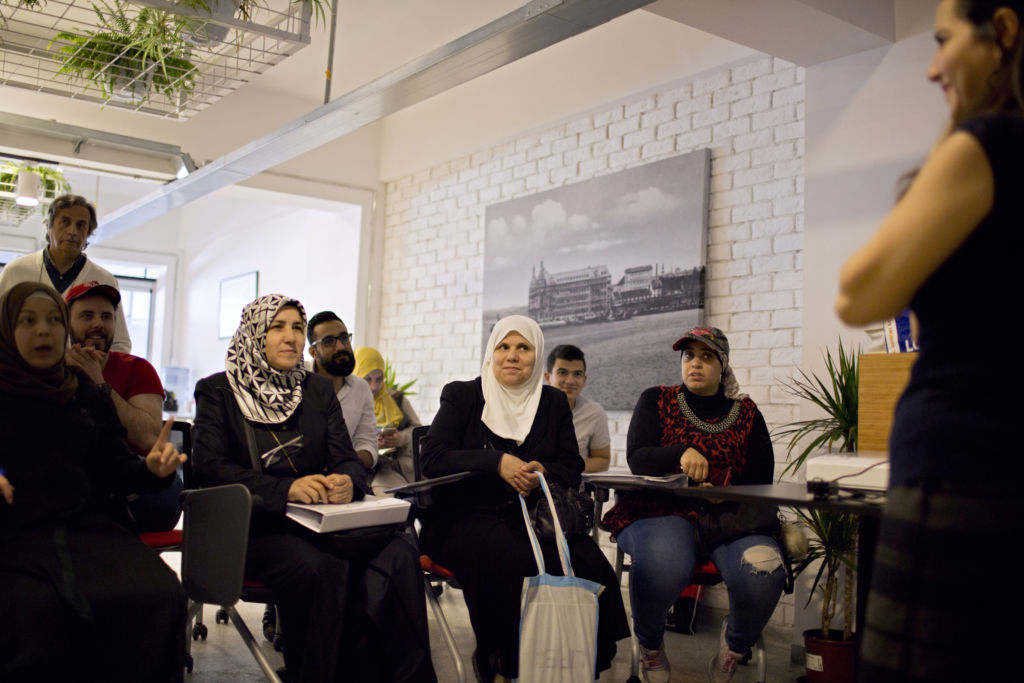
Note: The following post was originally published on NextBillion.net, which is managed by WDI.
By Amy Gillett and Kristin Babbie Kelter
There are currently 25.9 million refugees worldwide, as the world experiences the highest levels of displacement on record. These refugees fled their countries due to war, natural disaster or persecution, and were often forced to leave behind their possessions, as well as their livelihoods. So they are, in many ways, forced to start over upon arrival in their new country.
This process begins with finding a new livelihood. However, refugees may have trouble landing a job due to discrimination, legal barriers, language limitations and lack of social networks. Given these hurdles, it is not surprising that some refugees turn to entrepreneurship out of necessity. Starting a business – especially if their customers are primarily fellow refugees – can allow them to sidestep the obstacles of discrimination and language. It is also attractive in that it enables independence, allowing the entrepreneur to “be their own boss.”
But starting a business is a challenge for anybody, and business failure rates are high. How do refugees — faced with the additional challenges of being new to a country and often not speaking the language — manage to establish successful enterprises? It turns out that along with their unique challenges, they also bring some unique assets to the table. These attributes can both position them for success and enable them to enrich their host nation.
Resilience is an attribute that is often associated with successful refugee entrepreneurs. Experiencing crisis in their home countries, coupled with the difficulties of relocation, help shape a mindset conducive to entrepreneurship. Successful refugee entrepreneurs are driven and have a “one-way ahead” attitude. This attitude is not just about succeeding: It’s about surviving and having a decent, meaningful life after having lost so much. “They really just want to get moving towards a better life in which they are able to work to benefit themselves, but also their families and their communities,” says Mari Kira, a lecturer and research scientist at the University of Michigan whose work explores career and identity growth among refugees.
Rima Bizri, a professor at Rafik Hariri University in Lebanon, wrote a case study of Mostafa, a Syrian refugee who was forced to shut down his restaurant back home, and started a new restaurant in Lebanon. According to Mostafa: “Success meant a lot to me, but survival meant even more … To me, failure meant starvation and homelessness … Failure was unthinkable.” Mostafa was supported by his wife, who shared his vision and drive. “All we could talk about is the restaurant … our lives were centered on the restaurant … it was our passion,” she said.
Indeed, refugee entrepreneurs are rarely alone in their entrepreneurial journey. They’re able to enlist the support of their family members, and fellow countrymen and countrywomen, by creating a shared vision and showing how the business will benefit all of them. This social network can be a vital source of labor and moral support. By tapping this network for employees, refugee entrepreneurs find workers who speak their language, have similar cultural values, feel an obligation to one another and have compassion for them. Even those who aren’t blood relatives come to be treated as members of the family, creating a “pseudo-family business.” Such a strong unit has an inherent advantage in finding entrepreneurial success: Notably, nearly one-quarter of small businesses fail because they haven’t assembled the right team.
Furthermore, refugees tend to be good at bootstrapping their businesses. They start out with their personal savings, and sometimes supplement that with contributions from friends and family. Money earned from customers is plowed back into the business. Since outside capital is generally not an option, they become adept at reducing their operating costs to a minimum and drawing on their social networks for support when needed.
Take the case of Shaker Moutraji, a member of the U.S.-government funded Livelihoods Innovation through Food Entrepreneurship (LIFE) Project. He owned seven sweet shops in Syria — specializing in cheese Mamul — before he closed them the week the civil war began. After leaving Syria, Moutraji did not have any capital to open a cheese Mamul production business in his new home in Mersin, Turkey. To overcome this barrier and launch a business, he bootstrapped by borrowing 600 Turkish Lira (about US $100) to purchase a used refrigerator and ingredients to get started.
While some refugee entrepreneurs may remain small and limited to serving the market of fellow refugees, others will move beyond this “enclave economy.” When refugee entrepreneurs offer goods and services that are competitively priced and in demand, host community members will become customers. They will benefit from these valuable new products and services, and the entrepreneurs will enjoy access to a much larger market.
For example, Fatma Ahmed, who fled from the armed conflict in Yemen, is working to reopen the pastry shop she had owned back home – but this time in Istanbul. Ahmed, also a member of the LIFE Project, understands the importance of tapping into the Turkish market to expand her customer base. She is learning as much as she can about Turkish culture, which is crucial for marketing her business to Turkish customers.
But even with a high drive to succeed and a solid business model, refugee entrepreneurs can still be stymied by obstacles. To help these entrepreneurs succeed, institutions within host countries can offer various types of support. Governments should help them register and operate their businesses as legal entities, as well as facilitate their access to international markets, such as through participation in trade expos. Governments should also seek to provide human and social services, such as education for youth, language classes, and access to social workers, health care, and basic needs like housing and food.
NGOs, support organizations like accelerators and incubators, and local universities can also help refugee entrepreneurs. They can assist by providing counsel on legal and export matters, providing office space and equipment during the initial startup phase, and offering training on relevant topics such as business models, marketing, customer service, finance and accounting, and human resource management.
When entrepreneurship support programs are created, they should, when possible, be open to both refugees and the host community. An influx of refugees in a community can lead to a strain on local resources like housing, schools, and jobs, especially in areas that were already experiencing economic instability. The competition over resources – in combination with varying social norms and the temporary status of refugees – can make it difficult for refugees and host communities to come together as one community. Entrepreneurship programs that engage refugees can seek to build social cohesion by opening the program to a diverse audience and facilitating positive interactions. A successful example of this is the International Labour Organization’s Ready for Business program, piloted recently in Indonesia. The program provides entrepreneurship training to refugees from Afghanistan, Somalia, Eritrea, Ethiopia, Yemen, Iraq, Myanmar and Sudan – as well as local youth in the Jakarta neighborhoods where refugee shelters are located. The LIFE Project takes a similar approach to building sustainable livelihoods through entrepreneurship: its food incubator model and suite of business support services in Turkey engage refugees from countries such as Syria, Yemen, Palestine and Iraq, as well as local Turks. The project also has a gastrodiplomacy component to facilitate meaningful connections across cultures, using food as a vehicle.
While every refugee entrepreneur has a unique story, those who are successful can challenge the negative perceptions and images of refugees that often arise during humanitarian crises. This can help their host communities shift from viewing refugees as a financial and social burden, to seeing them as a source of vitality, spurring economic growth and job creation and introducing new products to the market. Successful refugee entrepreneurs bring focus, drive and commitment to their ventures, modeling the mindset any entrepreneur needs to grow a business.
Amy Gillett is the vice president of education at WDI. Kristin Babbie Kelterborn is a senior project manager at WDI. They lead WDI’s Entrepreneurship Development Center.
The authors would like to thank Rimi Bizri, Mari Kira, Eric Fretz and Ozge Savas for their contributions.
Photo courtesy of the Life Project.
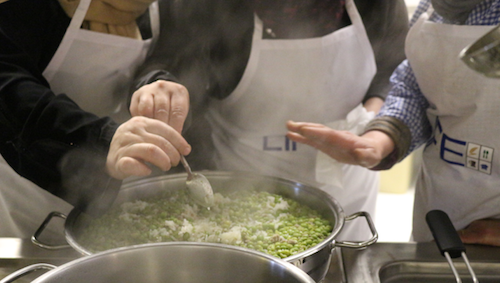
Note: The following was originally published on NextBillion.net, which is managed by WDI.
By Kristin Babbie Kelterborn and Amy Gillett
An entrepreneur in São Paulo seeks to refine palates by introducing unfamiliar Syrian dishes to the city and showing the uniqueness of his country’s cuisine – differentiating it from common and broadly labeled “Middle Eastern” food. In Toronto, a restaurant offers traditional Syrian dishes with a contemporary twist, such as manaeesh flatbread topped with avocado. In Washington, D.C., a chef from Damascus serves up his family recipes through a food delivery business for emerging immigrant chefs. These are just a handful out of thousands of stories of Syrian refugees starting food businesses in host countries and shaping those host communities’ perceptions of their culture through food.
In Istanbul, Mohamad Bakkar, a Syrian refugee and now food entrepreneur, produces his own special Syrian cheeses and yogurt. About three and a half years ago, Bakkar fled the civil war in Syria, where he was an electrical engineer. As a refugee in a new place, life was not easy. To improve his family’s situation, Bakkar opened his own food business in Istanbul. A year and a half since its founding, the business is growing and now has four employees. “It is the best way for a refugee who lives in Istanbul to earn money,” said Bakkar.
Syrians began fleeing their country against the backdrop of the Arab Spring, which first ignited in Tunisia and then spread throughout the Middle East and North Africa. Syria’s Arab Spring began in 2011, eventually leading to a catastrophic civil war and the proliferation of the Islamic State in the country. As of February 2016, 470,000 Syrians had lost their lives in the conflict and more than 6 million were internally displaced.
Turkey hosts more than half of all Syrian refugees, with some 3.5 million registered Syrian refugees in Turkey. Under Turkey’s Temporary Protection Regulation, Syrian refugees are eligible for free access to basic services such as healthcare and education. In the beginning of the Syrian refugee crisis, Turkey had planned to host the refugees in the short term only, not expecting the conflict in Syria to remain unresolved for years. The unprecedented magnitude of refugees and unanticipated length of their stay has presented widespread challenges to Turkey, from education to health to economic opportunities.
One of the greatest challenges for Syrian refugees is securing a job. Syrian refugees tend to work in the informal sector, so their jobs are not considered legal and do not come with social security benefits. Further, these jobs pay poorly and have substandard work environments. Despite the relative ease of establishing a business in Turkey, building a business is difficult anywhere, and Syrians in Turkey have the added challenge of doing so in a new country.
Enter the LIFE project. In 2017, the Washington, D.C. based non-profit Center for International Private Enterprise (CIPE) contacted the William Davidson Institute’s Education Initiative and its Entrepreneurship Development Center about partnering on the project. (Note: WDI is the parent organization of NextBillion). WDI agreed to join a consortium of U.S. and Turkey-based partners to launch Livelihoods Innovation through Food Entrepreneurship (LIFE). The U.S. State Department-funded project establishes two incubators, or Food Enterprise Centers, to support refugees and the Turkish host community in building businesses in the food sector.
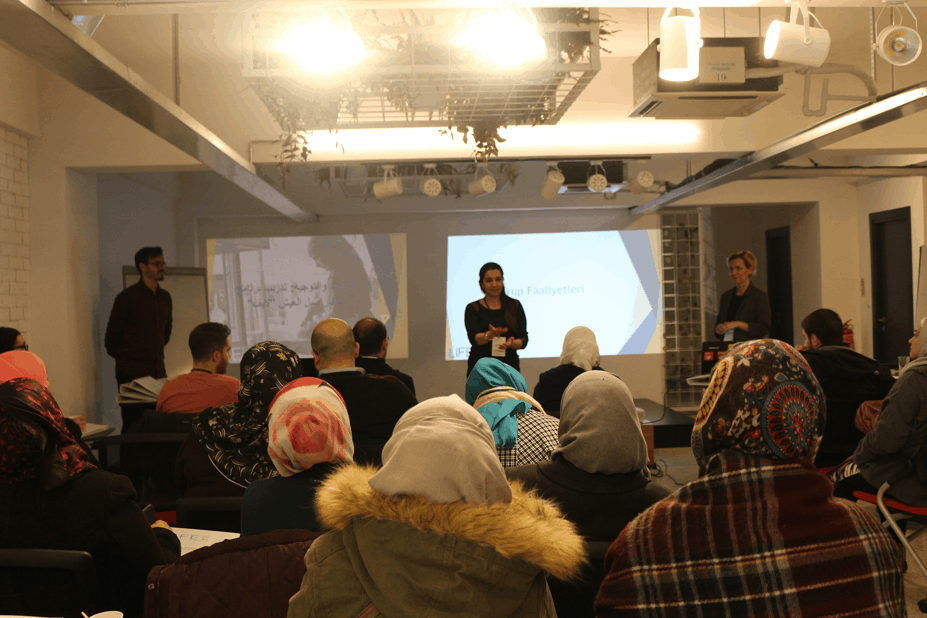
The first cohort of LIFE entrepreneurs attend a program orientation session in the new LIFE Food Enterprise Center in Istanbul. (Photo courtesy of IDEMA)
“Turkish and Syrian food cultures are similar. Syrian food is also loved by the Turkish host communities,” said Esra Arslan, Project Manager at IDEMA — an Istanbul-based non-profit dedicated to socioeconomic development. “With a good, solid business plan, even with little experience, it is most likely that your business will survive in the food sector than in any other sector in Turkey.”
Through the two-year LIFE project, 240 entrepreneurs will participate in a four-month program at the Food Enterprise Centers. (Mohamad Bakkar is a member of the Food Enterprise Center in Istanbul.) The program offers comprehensive entrepreneurship support services, the chance to participate in a business pitch competition, space in a shared commercial kitchen, access to mentorship, and legal and financial advice. Entrepreneurs will also attend people-to-people gastrodiplomacy events that use food as a medium for cross-cultural exchange among the participants.
“Gastrodiplomacy is especially important in the context of the current environment in Turkey,” says Johanna Mendelson Forman, Distinguished Fellow at the Stimson Center and leader of the LIFE gastrodiplomacy programming. “Bringing Syrian refugees together with Turkish citizens – all learning to build businesses around food – creates community and builds trust. Food plays a powerful role in helping to bridge cultural divisions by sharing a meal, or breaking bread. After all, the word ‘company’ is derived from the concept of coming together (‘com’) over bread (‘pan’), and Syrians are company in their new homeland.”
(You can learn more about gastrodiplomacy in an interview with Mendelson Forman featured here).
Turkey has a high unemployment rate and about one third of its private sector workforce is employed informally. As the country enters its eighth year of hosting Syrian refugees, job scarcity is a source of strain between Turkish host communities and these refugees. Most Syrian refugees in Turkey live among members of the host community, not in camps, alongside other refugees and Turkish citizens. Initiatives that work to socially integrate Syrian refugees into these communities and enhance cultural understanding between refugees and Turkish host communities are vital.
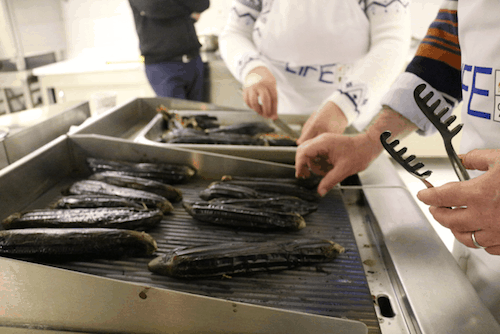
LIFE entrepreneurs cook eggplants – the key ingredient in Mutabal – during the opening event for the LIFE Food Enterprise Center in Istanbul. (Photo courtesy of IDEMA)
The LIFE project aims to promote this social cohesion through gastrodiplomacy. The program is open to anyone, including refugees from other countries and Turkish citizens, in addition to Syrians. Participants go through the program as a cohort, getting to know each other― including their different traditions and cultures ― along the way. Cross-cultural exchange events are held at the Food Enterprise Centers. Recipes with accompanying background stories will be collected from participants to feature in a cookbook.
Mendelson Forman says, “As Ramadan approaches we are planning to host gastrodiplomacy events at the food entrepreneurship incubators. Refugee trainees hosting Iftar, or fast-breaking dinners, at the centers affords an opportunity for people in the neighborhoods to learn more about different cultures and cuisines, and to do so in a neutral environment.”
The LIFE project welcomed its first cohort of entrepreneurs in February 2018. The creativity and desire to innovate exhibited by these entrepreneurs is extraordinary, and shows the potential of Syrian refugees – as well as Turkish citizens and other refugees – to discover sustained livelihoods as entrepreneurs in the food sector. Through the LIFE Food Enterprise Centers, a butcher wanting to be the next Salt Bae, an agricultural engineer creating a new product line of honey, or a pharmacist developing medicinal dishes will receive the necessary support to launch and build their enterprises in Turkey.
Kristin Babbie Kelterborn is a senior project manager at the William Davidson Institute at the University of Michigan.
Amy Gillett is the vice president of Education at the William Davidson Institute.
The authors thank their colleagues at IDEMA for interviewing and providing information about the entrepreneur, Mohamad Bakkar, profiled at the beginning of the article.
The Livelihood Innovations through Food Entrepreneurship (LIFE) project is made possible by the United States Government. The LIFE project is a collaborative effort of its consortium members, which include the Center for International Private Enterprise, IDEMA (International Development Management), Union Kitchen, The Stimson Center, and The William Davidson Institute at the University of Michigan.
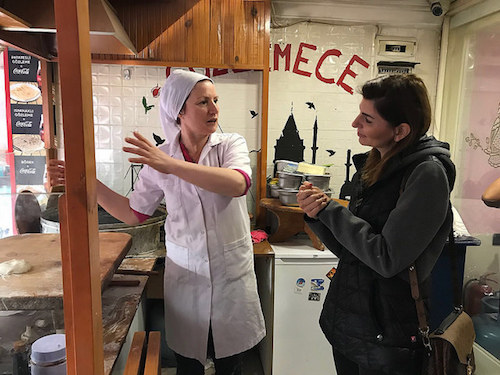
A member of the LIFE project consortium speaks with a Turkish business owner of a small crepe restaurant about her perspective on hiring people of different cultures, including Syrian refugees.
Two WDI representatives traveled to Turkey earlier this month as part of the Institute’s work on a project, led by the Center for International Private Enterprise (CIPE), that aims to develop sustainable livelihoods in the food sector for Syrian refugees and their host communities.
WDI Senior Project Manager Kristin Babbie Kelterborn and WDI Faculty Affiliate Peter Scott traveled to Istanbul and Gaziantep to collaborate with other project partners to conduct a mapping and discovery process to understand the specific needs of the target populations.
The project, “Livelihoods Innovation through Food Entrepreneurship,” or LIFE, will set up Food Enterprise Centers (FECs) in the two Turkish cities to train 20-40 entrepreneurs at a time on how to run food-based businesses. The centers will serve as incubators, and in addition to a kitchen, will feature space for meetings, co-working and training.
Scott has experience teaching entrepreneurship courses at various universities, conducting entrepreneurship training programs in Bahrain and Papua New Guinea, and has advised over 20 start-ups as a business development consultant. Kelterborn supports WDI’s Entrepreneurship Development Center (EDC) and brings her academic training in the sociology of food and agriculture, as well as her previous experience providing business development support to food and agriculture-based businesses at an accelerator, to the project.
During the trip, Kelterborn and Scott participated in a mentorship environment assessment, and developed a summary of the trip with a detailed action plan for upcoming program phases.
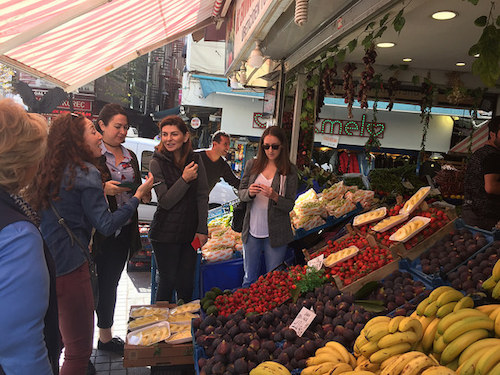
Members of the LIFE project consortium visit a produce stand in Turkey and interview the owner on how a green grocer sources his produce. The team sought his perspective on how he could potentially benefit from the LIFE Food Enterprise Center.
WDI will also develop tools for establishing an entrepreneur mentoring program at the FECs. Finally, WDI is represented on the Steering Committee of the LIFE project. In this capacity, the Institute will provide entrepreneurship-related advice and expertise on the structure and setup of the FECs and contribute ideas for a local ownership model to promote sustainability beyond the lifecycle of the program, among other duties.
The FECs will also provide workforce development training for an anticipated 1,000 workers in the food sector covering topics such as food and beverage management, procurement, and customer service skills.
In addition to CIPE and WDI, other members of the project consortium are: Union Kitchen; IDEMA (International Development Management); and, The Stimson Center.
Turkey has the largest refugee population in the world, including more than 3 million Syrians, a number that stood at about 170,000 at the end of 2012. Most of the Syrians entering Turkey have fled the country’s civil war. Formal unemployment among the refugee population is high, and tensions have flared between refugee and citizen communities.
The food sector in Turkey is a promising pathway for Syrian refugees to strengthen their livelihoods, ultimately benefitting the Turkish economy and society. Using food as a means of cross-cultural engagement and understanding, known as “gastrodiplomacy,” is a main focus of the LIFE project.
“Food is an effective way to foster cross-cultural connections,” said Amy Gillett, vice president of WDI’s Education Initiative and the EDC. “The South Koreans are known for ‘kimchi diplomacy’ – forging ties globally and building a strong country brand through popularizing their famous fermented cabbage and dishes such as bibimbap. We hope to see similar goodwill arise from this project, with Syrian specialties like manoushi bread and fatteh reaching more palates and opening up new opportunities for Syrian refugees.”
The Vital Voices GROW Fellowship invests in women business owners in emerging economies over a yearlong fellowship. Here, four business owners talk with Nathan Rauh-Bieri about how, in the final stage of the fellowship, they implemented and revised their action plans and evaluated progress toward their growth goals.